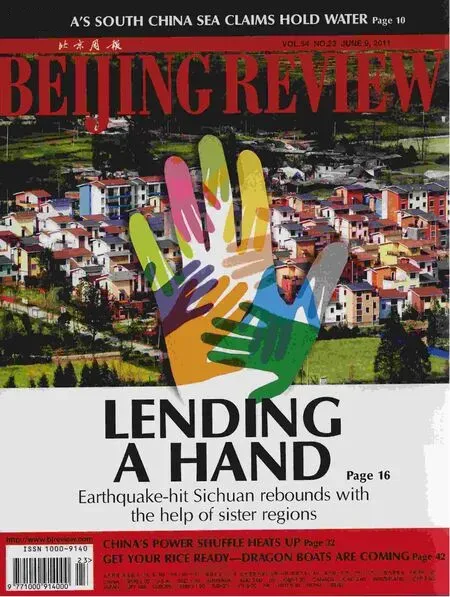The Birth of a Plan
By JIN MINQING
The Birth of a Plan
By JIN MINQING
The formulation of the 12th Five-Year Plan shows the operation of China’s public policy-making mechanism
In March 2008, the National Development and Reform Committee (NDRC) began to evaluate the progress of the 11th Five-Year Plan for National Economic and Social Development (2006-10), in an effort to push forward its implementation and prepare for the formulation of the next big blueprint. At the end of that year, the NDRC published 39 major subjects under eight categories for the formulation of the 12th Five-Year Plan (2011-15), and invited bids to carry out relevant studies. Thousands of experts and researchers focused on hundreds of topics, which finally yielded research reports of millions of words. Based on these reports, the NDRC set out to draft the basic lines of the 12th Five-Year Plan and reported to the Central Committee of the Communist Party of China (CPC) and the State Council.
A panel chaired by Li Keqiang, a member of the Standing Committee of the Political Bureau of the CPC Central Committee and a vice premier of the State Council, was formed in February 2010 by the CPC Central Committee to draft its Proposal for the Formulation of the 12th Five-Year Plan, consisting of staff members of the State Council Research Offce, the NDRC and other departments. Panel members studied relevant materials, conducted themed group investigations in different places and then drafted outlines of the proposal that were reviewed by top leaders.
Then a draft proposal was formulated on instructions of top leaders and opinions of concerned parties, and was circulated for feedback. Over repeated revisions, the proposal was submitted to the Fifth Plenary Session of 17th CPC Central Committee in October 2010 for deliberation. Wen Jiabao, a member of the Standing Committee of the Political Bureau of the CPC Central Committee and Premier of the State Council, made explanations of the proposal on behalf of the Political Bureau of the CPC Central Committee. The proposal was published after the session reviewed and approved it.
The proposal lists major development objectives, guidelines, principles, strategies and tasks of the 12th Five-Year Plan, laying foundation for its formulation. While participating in the formulation of the proposal, the NDRC began to draft the Outlines of the 12th Five-Year Plan. The frst version of the draft outlines was completed after the CPC Central Committee’s proposal was published. It was upgraded to a fnal draft at the National Development and Reform Conference in December 2010 after a lot of consultations and coordination efforts.
After that, an expert panel for national development planning, which was composed of 37 experts from economy, science and technology, business and other sectors, made repeated discussions, consultationsand feasibility studies of the outlines. After revisions were made in accordance with opinions from concerned parties, the proposed outlines were submitted for deliberation at executive meetings and plenary meetings of the State Council and meetings of the Standing Committee of the Political Bureau of the CPC Central Committee and the Political Bureau of the CPC Central Committee. The meetings fnalized the formal version of the outlines.
Article 62 of the Constitution of the People’s Republic of China stipulates, the National Peoples Congress (NPC) exercises the power to examine and approve the plan for national economic and social development and the reports on its implementation. So the State Council submitted the Outlines of the 12th Five-Year Plan to the Fourth Plenary Session of the 11th NPC in March 2011. The session examined and endorsed the outlines, which were later made public.
The research and formulation of the 12th Five-Year Plan were directly overseen by the CPC Central Committee. During the draft of the CPC Central Committee’s Proposal for the Formulation of the 12th Five-Year Plan, General Secretary Hu Jintao of the CPC Central Committee presided over several discussions by the Standing Committee of the Political Bureau of the CPC Central Committee and the Political Bureau of the CPC Central Committee, made instructions on some major issues and gave directives on themes, guidelines and major tasks and measures of the plan.
The formulation of the 12th Five-Year Plan was also a process of research and investigation, which included pre-study, follow-up research during the formulation and supplementary research. The research programs involved top Party and state leaders, NPC deputies and members of the National Committee of the Chinese People’s Political Consultative Conference, experts and scholars and government agencies. For instance, the nine members of the Standing Committee of the Political Bureau of the CPC Central Committee and other members of the Political Bureau of the CPC Central Committee conducted investigations on specific topics in different regions of the country after March 2010, respectively. At the end of 2009, the NDRC launched themed investigation programs in east, west and central regions.
The formulation of the 12th Five-Year Plan is a model giving full play to the democratic centralism and collective wisdom.
The CPC Central Committee had put together all the wisdom of the Party to work out its Proposal for the Formulation of the 12th Five-Year Plan.
In drafting the Outlines of the 12th Five-Year Plan, Premier Wen Jiabao presided over a number of symposiums attended by experts from different sectors, entrepreneurs, workers and farmers. The State Council organized meetings to listen to the voices of different regions and government departments. The NDRC lent an ear to opinions from Hong Kong and Macao special administrative regions. The CPC Central Committee also had meetings with leaders of democratic parties and All-China Federation of Industry and Commerce and representatives of nonparty personage to collect their wisdom.
Through these efforts, the wisdom of the Party and the whole society was mobilized to contribute to the formulation of the 12th Five-Year Plan.
The author is a researcher with the Marxism Institute, Chinese Academy of Social Sciences

